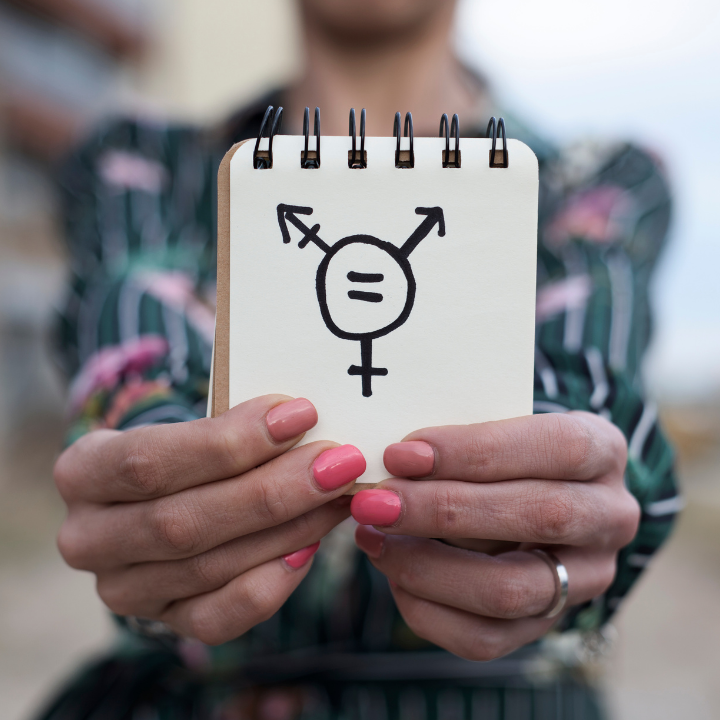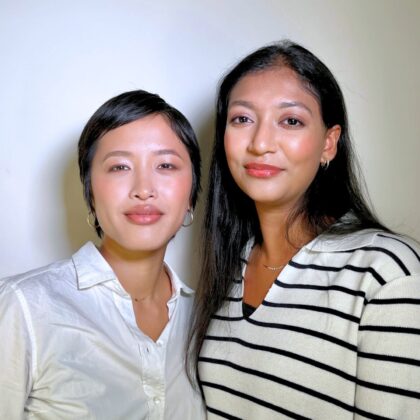A sex coach explains common sexuality terms you might be using wrong…
The sad truth is, many of us didn’t receive a great sex education growing up, so our knowledge and vocabulary in that department may be lacking. To make matters worse, new terms and phrases are being coined so often it’s hard to keep up! As a sex coach, I felt compelled to look at some of the most commonly misunderstood and misused sexuality terms and help demystify them.
Read more: The Orgasm Gap – What Is It And How Can I Close It?

LGBTQIA+
This acronym stands for a number of sexual identities, namely lesbian, gay, bisexual, transgender, queer, intersex and asexual. A plus sign is sometimes added to the end to represent other sexual identities, including pansexual (see definition below) and omnisexual.
While the term “queer” is included as its own identity, many people refer to themselves as queer as the term encompasses any sexuality that is not heterosexual. The “Q” can also sometimes stand for “questioning”, that is, individuals who are undecided.
Pansexual
Pansexual refers to a person who is emotionally and physically attracted to people of all genders. This term became mainstream by way of celebrity pansexuals such as Miley Cyrus and Cara Delevingne.
There’s a lot of overlap between bisexuality and pansexuality, even within the queer community. Nowadays, some people consider the term bisexual to be inclusive of all genders, whereas others have favoured using “pansexual”, given that the prefix “pan-” means “all-inclusive”.
Demisexuality
This term describes a pattern of sexual attraction in which a person is only attracted to people they are emotionally close to, and is more of an add-on to a person’s identity rather than being its own distinct sexual orientation.
A demisexual can identify as gay, straight or may not have a gender preference when it comes to sexual attraction. It’s more about how one goes about a relationship rather than who one wants to be in a relationship with. Demisexuals tend to abstain from casual sex because they don’t experience an immediate attraction to the outer appearance of a person.
Gender (or gender binary)
The concept of gender is a complex one and as a term, it is often confused with biological sex, of which there are two: male of female. The common thinking is that if you have a penis, you are a man, and if you have a vagina, you are a female – but this is not always the case.
Gender binary is the classification of gender characteristics into two distinct, opposite forms – masculine and feminine – which don’t overlap. A more modern understanding of gender rejects this classification (see gender fluidity below) and places multiple variations of gender on a spectrum.
Gender fluidity
People who are gender fluid fluctuate between different genders over time, or perhaps don’t identify with any gender at all. Gender fluid people might prefer more gender-neutral pronouns such as “they/them”, as opposed to “he/she”. If you find yourself in a situation where you are unsure of someone’s preferred pronoun, most people would happily give you an answer if you respectfully ask them.
It is also important to note that gender and sexuality are not inherently linked. Someone who is gender fluid may always choose to go to bed with a woman, regardless of what gender they are identifying with or expressing at the time.
Cisgender (or cis)
The term cisgender, which emerged in the 1990s, refers to people whose sense of gender identity matches that of the gender they were assigned at birth. This term was coined in response to the term “transgender” (see definition below) growing in popularity.
This term is often confused with the term “heterosexual”, which describes a person’s sexual orientation, however the two should not be used interchangeably. A cisgender person may not necessarily be sexually attracted to the opposite sex as heterosexuals would.

Transgender
The word transgender is a general term used to describe someone whose gender identity is different to their biological sex as birth. This is opposite to cisgender people. The term also encompasses those who are transsexual, that is, those who have changed their bodily characteristics through surgical means or hormonal treatment.
Kink
When we hear the word “kink”, we may be inclined to imagine BDSM sexual practices such as whipping, spanking and choking. However, the word simply refers to sexual activity that deviates from the social “norm”. This being said, due to the popularity of porn and the likes of 50 Shades of Grey, kinkiness is becoming ever more mainstream.
Vulva
Most people use the word “vagina” to refer to the entire female genital, but the vagina solely refers to the birth canal. The word vulva refers to the external parts of the female genital, including the clitoris, labia and vaginal opening.
Unfortunately, for many of us, the sex education we received in school placed an emphasis on reproduction rather than pleasure, which is why around 73% of women are unsure about where their vulva is located.
Polyamory
Polyamory is the practice of engaging in multiple simultaneous romantic relationships, with the knowledge and consent of everyone involved. This is not to be confused with being in an open relationship or “swinging” which, in terms of relationships, refers to someone who has casual, non-emotional sex outside of their relationship, but often does not engage in intimate, loving relationships with more than one person.
Polyamory is an umbrella term for a range of different types of non-monogamous relationships, for example, triads (a relationship between three people) and quads (a relationship between four people).
Why Using The Right Sexuality Terminology Matters
Words have power. As much as we may want to avoid labels, there’s no denying that many of us feel validated when we find the right word to accurately describe parts of our identity, as it helps us feel seen and understood in society. It also helps us find common ground with people who identify themselves similarly.
Knowing the correct terminology for our sexual body parts is also important for our sexual health and safety, from both a medical and legal perspective. And it is something I believe should be taught from a young age.
If you’ve come to the realisation that your sex education is lacking, don’t worry! Luckily, there are sex coaches like myself who have plenty of experience and resources to help you become better educated in all things related to sex and sexuality and become better in bed! See the author bio below for my details.
Featured image courtesy of @sexinconversation for Sassy Media Group, image 1 courtesy cottonbro via Pexels, image 2 courtesy of nito100 via Getty.





 Eat & Drink
Eat & Drink



 Travel
Travel



 Style
Style



 Beauty
Beauty



 Health & Wellness
Health & Wellness



 Home & Decor
Home & Decor



 Lifestyle
Lifestyle
 Weddings
Weddings









